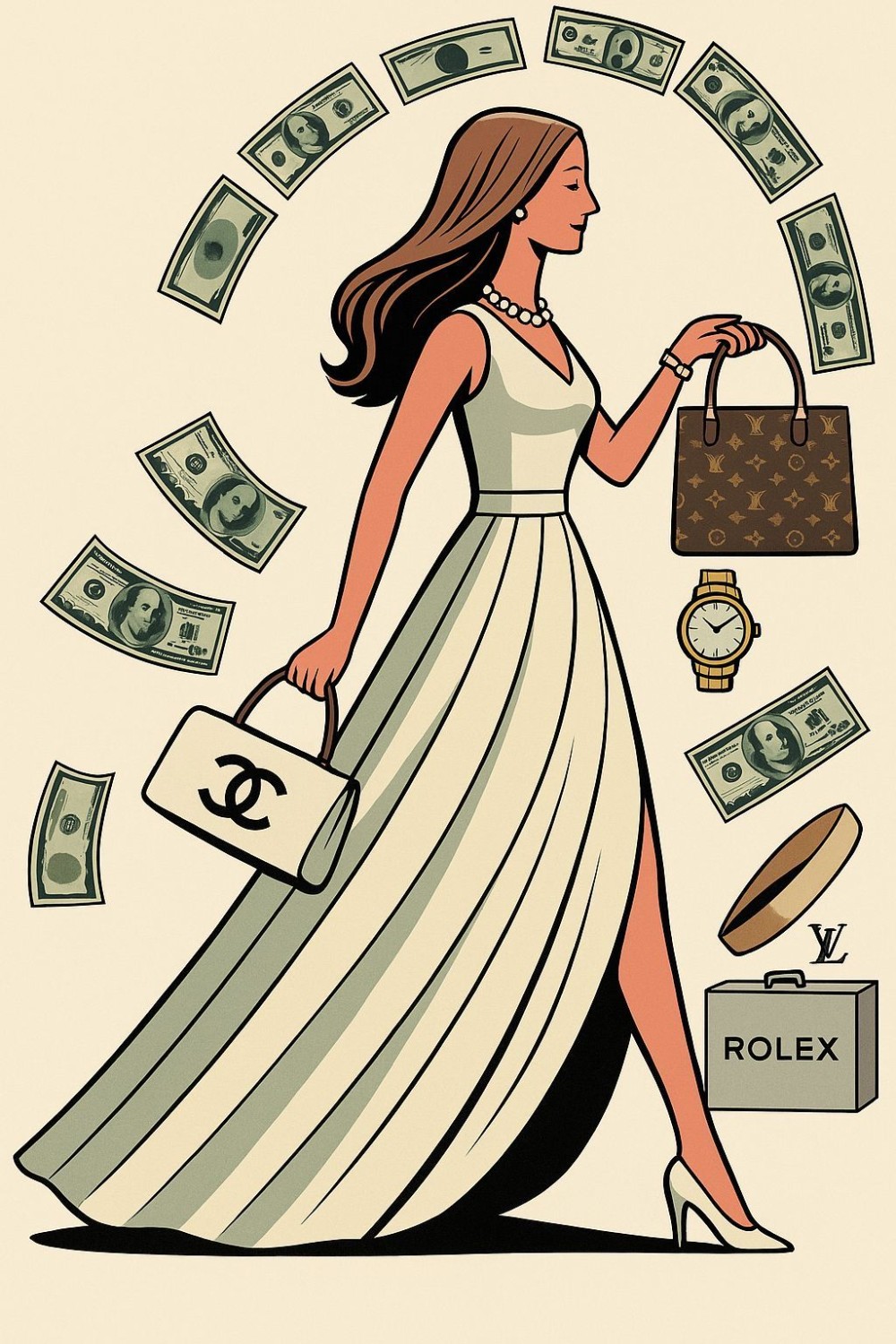Illustration by Ruhi Bishnoi

While inflation has pinched the wallets of many, it’s ironically fueling the growth of luxury fashion. As most consumers scale back on spending due to rising costs, iconic brands like Chanel, Rolex, and Hermès are boldly raising their prices, sometimes surpassing inflation itself. For some, it's a response to economic pressures; for others, it’s a strategic move to preserve their elite status.
Luxury brands excuse their price inflation by claiming inflation pressures and rising material costs, but their figures do not hold up. Consider, for instance, Chanel in 2019, the average price for a Classic Flap bag stood at $5,800. At present, it has reached about $10,200, a phenomenal increase of about 76% in price. Chanel justified this by claiming a commitment to quality and exclusivity. This argument was pushed by the CEO, Leena Nair for the price hike, she said "We use exquisite raw materials and our production is very rigorous, laborious, handmade-so we raise our prices according to the inflation that we see." But is there more to it? Many consumers and analysts suspect otherwise, wondering whether such price bounds are truly to do with keeping up with cost or simply to maintain their ultra-high-end status.
The watch market is no different. Patek Philippe and Rolex rank among the world's most desirable brands, but to purchase them at retail is effectively impossible for someone who lacks any insider affiliation. On the secondary market, though, such timepieces tend to fetch two to three times their retail price. Are these brands genuinely facing supply chain restrictions, or do they limit production on purpose to keep demand strong? Most industry professionals believe the latter.
Beyond the realm of economics, luxury brands have learned a thing or two about price psychology. Economists call it the Veblen Effect; as the price for some luxury items rises, so does their demand. In contrast to mass-market items, a client does not buy Chanel handbags or Rolex watches just for their fine craftsmanship; he or she buys them for their prestige. Price hikes aren’t just about inflation; they create an aura of exclusivity around such goods. In short, the higher the price, the more desirable they become.
Hermès exemplifies this strategy. The brand, synonymous with scarcity and strict pricing, increased the price of an average Birkin bag by nearly 10% in 2023, exceeding inflation rates. A close examination of the discourse further reveals the possible truth that these bags do not just serve as accessories but genuine investments, worth holding and appreciating. Louis Vuitton had equally to trade from a playbook wherein multiple price raises go within a year despite the depressing foreign retail markets. These luxury goods stack up nowadays according to Business of Fashion on an average basis for around fifty-four percent more than they did during 2019. Yet, sales remain booming-some even argue more than ever. Why? Because these have successfully groomed the idea that affordability in hand and wrist should become a tag as status hallmark for completion in being successful. However, it too ends up being an ethical debate. Should luxury companies literally be allowed to raise prices this steeply while others are still cash-strapped? Some would just say that this is merely a business concept as the saying goes"If you find someone willing to pay, why not charge him more?" while some see it as a deliberate ploy to keep out regular buyers, thus making it all the more desired by ultra-high-net-worth individuals.
So, what’s next in the future? Will brands continue to push prices higher, or are we approaching a breaking point? History suggests that as long as affluent consumers remain eager to buy into exclusivity, luxury brands will continue raising prices, regardless of economic conditions. But there’s always the risk of alienating aspirational buyers, the ones who save up for a dream luxury purchase, if prices keep climbing.
Indeed, changes in behavior control the portion of this high drama. The industry remains high-class and entry-level as long as there is pursuit by people to be status seekers, this profit will always be there for these brands, be it a recession or not.
Ruhi Bishnoi is a Data Science, Economics, and Business student at Plaksha University, set to graduate in 2027. She is passionate about leveraging data-driven insights to drive strategic business decisions and create meaningful impact.





